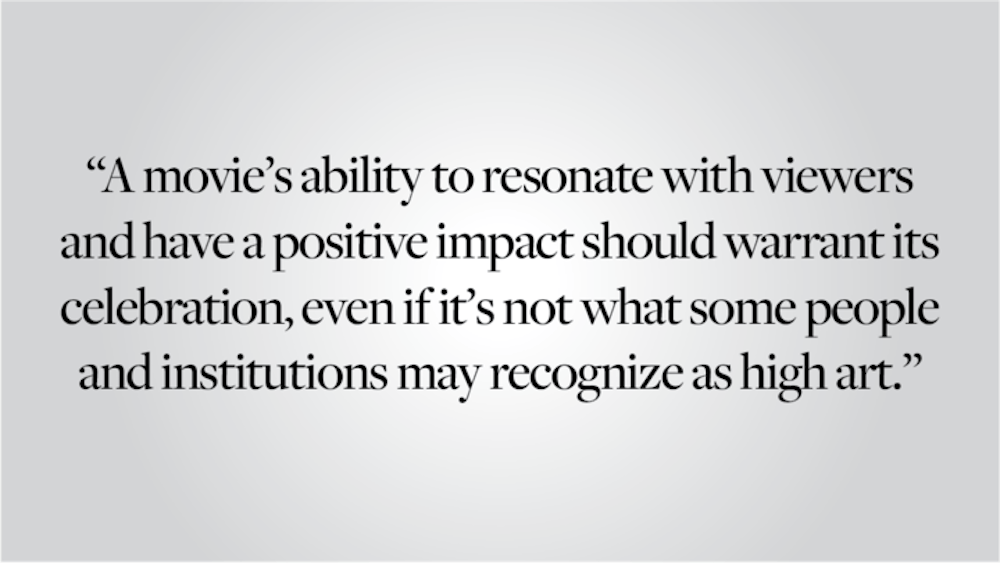I have always been drawn to fictional heroines. Throughout my adolescence, I idolized and tried to emulate female characters because I found their strong sense of self, ambition and determination to be extraordinary. In “Barbie,” the titular character’s journey came to represent something even greater for me and so many other women in my world. But, the reaction to the movie’s immense impact seems to be one of undermining the movie’s artistic value due to being too “commercial” or mainstream. The backlash, I believe, is unwarranted: a movie’s ability to resonate with viewers and have a positive impact should warrant its celebration, even if it’s not what some people and institutions may recognize as high art.
Leaving Providence Place Cinemas after watching the “Barbie” movie last July left me with a wholly different sense of admiration. I would have expected a movie that takes an aggressive stance on representing feminist ideals and the brutal realities of women’s experience to leave me with a burning sense of female rage. In many ways, the film did upset me. I was unsettled that every line in the screenplay resonated with me. I was disappointed that so many of my female friends were focused on whether our male peers understood the movie’s message, instead of focusing on how perfectly we all understood each other. But, to my surprise, beyond these tensions, I was thrilled because I knew that all the sensational qualities that this movie’s heroine embodied were already within me.
The “Barbie” movie helped me tap into a self-confidence that was entirely my own. Greta Gerwig immerses viewers into and back out of “Barbie Land” to effectively manifest the same awakening in the viewer that her characters experience on screen. Over the course of two hours, I felt just as “un-brainwashed” about my own life as the Barbies did. But I feared the temporal nature of cultural phenomena. I was scared my newfound feeling of empowerment, hope and solidarity would fade after a few months when our patriarchal reality quieted the “Barbie” excitement and stigmatized feminism again.
The patriarchy, it seems, found a way to crush female solidarity once again. Scathing reviews cast the “Barbie” movie as flashy, commercialized and unoriginal in its feminist standpoint. Some have called its “woke messaging” polarizing. Others called it exhausting, or even downright humorless. In the midst of all this critique, what happens to all the moments that profoundly resonated with viewers? How will we protect the hopeful momentum that this movie inspired in me and many others in the face of public dismissal? Why is it that when women get excited about empowering themselves and feeling confident in who they are, the patriarchy finds a way to make them feel embarrassed, label them as obnoxious or call them too loud?
Even at the most recent Academy Awards, “Barbie’s” popularity and feminist messaging made it the target of criticism. People claimed the movie didn’t even deserve nominations for the prestigious awards, and the movie’s lack of wins (and nominations in categories like directing) seemed to value it as lesser than some of the show’s big winners, like “Oppenheimer.” However, it’s not like the Academy is a stranger to recognizing more mainstream movies. In 2010, “Avatar” was nominated for nine Oscars and won three of them. “Titanic,” directed by the same man, won eleven Oscars, including best director. Why could these blockbusters receive such accolades, while “Barbie” is somehow an affront to high-brow cinema?
Maybe “Barbie” isn’t the most artistically complex and experimental film of all time, but it was never supposed to be. Ultimately, the biggest movie of 2023 was explicitly feminist, and that in and of itself is an achievement. The positive impact this movie had for women across the globe should be worthy of recognition. The “Barbie” movie shouldn’t go down in history as a “two-hour commercial” — women like me who felt understood by the movie are living examples of its profound impact. If a movie can make a positive difference in one individual's life, it has the ability to make a universal impact and this power should be recognized, harnessed and valued.
Meher Sandhu ’25 can be reached at meher_sandhu@brown.edu. Please send responses to this opinion to letters@browndailyherald.com and other op-eds to opinions@browndailyherald.com.





